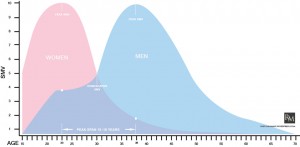
INTERNET — Men on Reddit forum The Red Pill want to help men become better men, but what does that mean? What is masculinity?
In swallowing the forum’s eponymous Red Pill, a man accepts an uncomfortable reality constructed of carefully plucked scientific statistics framed up by the capitalist “sex market” metaphor. In short, most Red Pill men believe women seek out muscular and boisterous men who will “neg” or casually insult women because this telegraphs a man’s high “sex market value.”
This infantile caricature of masculinity by self-proclaimed ‘puerarchists‘ (boy-rule-ists) instructs men that perceived masculinity is the only real masculinity. And maybe it is this masculinity that will get socially confused or rejected young men laid, but at what cost? Is this real masculinity?
Frederich Nietzsche self-published a corpus of world shattering literature and red faced rants targeting out every “great man” who’d been wrong about something in the past. Sure, he only had sex once in his life with a hooker and went home with a fatal case of Syphilis, but the great masculine “no” of Thus Spake Zarathustra echoes to this day.
Johannes Kepler said “no” to Ptolemaic astronomy, inventing an entirely novel solution for the movement of the planets. Partly because of his contempt for systems — including his own — Kepler was the first man on record to perceive ovals in planetary motion where others had seen only circles. Not only did Kepler’s heroic and recursive “no” help snap humanity out of thousands of years of blinding cosmological tradition, but he was doubly a man for saying “no” to prestige at every opportunity.
Perhaps the most famous philosopher in the western world, Socrates, did not gain his reputation by accident — he was a towering example of manhood. He did not write a single word of his all-the-more influential “no,” and when given a chance to apologize and go along with Athenian society, he could only say “no” and be put to death. Even as his disciples begged him to flee for his life, Socrates said “no.”
That masculinity must always look like hubris or ignorance to others, and it isn’t likely to get anyone laid. If masculinity is that very assault on perception itself, that “no” to the “natural attitude,” then clearly Red Pillers have left their masculinity at the door. A man who will change himself simply for social approval (sex) is no man at all. Especially in feminist literature worth anything at all, that kind of masculinity is ever present as it challenges the “natural attitude” and tears down invisible edifices of blinding tradition. It is the feminists, after all, who saw that linking submissive or yielding tendencies with the feminine, saying “yes” as opposed to that “masculine no,” is a language system of the patriarchs (or perhaps puerarchs).
Somewhere on earth in some small village maybe gender identities do not emerge or sew themselves into the fabric of power relations. But not here. So “what is it to be a man?” is not a question to be dismissed in a muddy mess of postgender postmodernisms or far worse, given over to its most popular and sexually gratifying answer. It is also not a question to be passed over in silence or generalized. Masculinity must remain a secret in its quiet corner, crazily working out its solipsistic answers as the rest of the world laughs and jeers.
